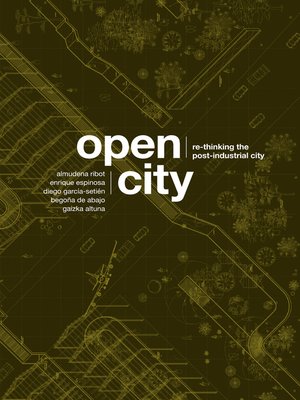Open City
ebook ∣ Re-thinking the Post-Industrial City / Re-pensando la Ciudad Postindustrial
By Almudena Ribot

Sign up to save your library
With an OverDrive account, you can save your favorite libraries for at-a-glance information about availability. Find out more about OverDrive accounts.
Find this title in Libby, the library reading app by OverDrive.



Search for a digital library with this title
Title found at these libraries:
| Library Name | Distance |
|---|---|
| Loading... |
This publication inquires into the future of post-industrial cities framing and speculating on different industrial contexts: archipelagos (Eibar), fabrics (Cobo Calleja), assemblies (Detroit).
Currently 55% of the world's population lives in cities, predictably reaching 70% in 2050. Cities are organisms in continuous transformation: growth, change, but also shrinking or collapse. Open City explores and speculates from contemporaneity about the future of the post-industrial city, where industrial archipelagoes (S), frames (XL) and obsolete or deprogrammed singularities (M/L) represent critical contexts but also opportunities for a new Open City.
Open Systems have been the research focus of CoLab since 2013. This book collects some relevant and engagingly contemporary insights. It also includes new unpublished interviews and articles with international participants leading players in this field.
CoLaboratorio is a research, prototyping and production space. From the contemporary architecture project CoLab works around industrialization, flexible systems, project participation and collaborative dynamics.
With Contributions of: Pier Vittorio Aureli, Marta Catalán, Klaske Havik & Hans Teerds, Juan Herreros, Andrés Jaque, Momoyo Kaijima, María Langarita & Víctor Navarro, Philipp Oswalt, Cedric Price, Andrés de las Alas & Alberto López, Colectivo Berreibar, Almudena Ribot, Enrique Espinosa, Diego García-Setién, Begoña de Abajo, Gaizka Altuna.
Bilingual edition in English & Spanish
Currently 55% of the world's population lives in cities, predictably reaching 70% in 2050. Cities are organisms in continuous transformation: growth, change, but also shrinking or collapse. Open City explores and speculates from contemporaneity about the future of the post-industrial city, where industrial archipelagoes (S), frames (XL) and obsolete or deprogrammed singularities (M/L) represent critical contexts but also opportunities for a new Open City.
Open Systems have been the research focus of CoLab since 2013. This book collects some relevant and engagingly contemporary insights. It also includes new unpublished interviews and articles with international participants leading players in this field.
CoLaboratorio is a research, prototyping and production space. From the contemporary architecture project CoLab works around industrialization, flexible systems, project participation and collaborative dynamics.
With Contributions of: Pier Vittorio Aureli, Marta Catalán, Klaske Havik & Hans Teerds, Juan Herreros, Andrés Jaque, Momoyo Kaijima, María Langarita & Víctor Navarro, Philipp Oswalt, Cedric Price, Andrés de las Alas & Alberto López, Colectivo Berreibar, Almudena Ribot, Enrique Espinosa, Diego García-Setién, Begoña de Abajo, Gaizka Altuna.
Bilingual edition in English & Spanish







